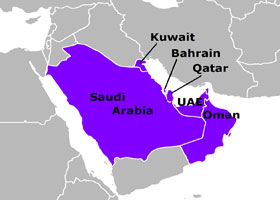 The United States risks damaging relations with Persian Gulf states as it warily embraces a Russian initiative for Syria to relinquish its chemical arsenal, analysts say, with Sunni monarchies fearful that the U.S. pullback from military strikes will bolster President Bashar al-Assad and the influence in the region of his ally Iran.
The United States risks damaging relations with Persian Gulf states as it warily embraces a Russian initiative for Syria to relinquish its chemical arsenal, analysts say, with Sunni monarchies fearful that the U.S. pullback from military strikes will bolster President Bashar al-Assad and the influence in the region of his ally Iran.
Disappointment at the decision could further cool relations with gulf countries already frustrated by a lack of U.S. leadership on Syria during the 21 / 2-year-long conflict there. Increasingly sharp statements from the normally imperturbable gulf nations reflect the growing sense of unease.
Saudi Arabia, which is spearheading military support for the Syrian rebels, hadpublicly backed the idea of U.S. strikes, and the rebels themselves had said they hoped to capitalize on any action — however narrowly targeted — to gain ground against government forces.
For gulf states including Saudi Arabia, a longtime U.S. ally, the fight to oust Assad plays into a wider regional struggle against the influence of Shiite Iran. And many in the region fear that capitulating to Russia’s plan may do the opposite, bolstering Assad and his allies. Kuwait and Qatar are among those that have signed a White House-sponsored statement condemning Syria for the alleged chemical weapons attack Aug. 21 and calling for a robust international response.
“The gulf feels misled,” said Mustafa Alani, a Geneva-based security analyst with the Gulf Research Center, referring to the U.S. shift. “Certainly, there’s a fear that this means Iran will be much stronger. Strategically speaking, the Iranian position is going to be enhanced in the region.”
One of the main worries for the Gulf Cooperation Council, he added, is “that Syria and its allies have gained the upper hand.”
At a summit of the council’s six member countries in the Saudi capital, Riyadh, on Tuesday night, Bahraini Foreign Minister Khalid bin Ahmad al-Khalifa called for “deterrent measures” against Syria, telling reporters that the Russian proposal is “all about chemical weapons but does not stop the bloodshed.”
The statement issued at the summit “expressed deep disappointment and could be taken as an indirect criticism of the U.S.,” Alani said.
The cooling comes as the United States finds its other traditional alliances in the region weakened in the wake of the Arab Spring. The gulf countries, long mistrustful of the Muslim Brotherhood, have backed Egypt’s new interim government, while the United States has greeted it with caution.
Although analysts see little likelihood that economic and defense ties between Washington and its allies in the region will change significantly, some say gulf states, including Saudi Arabia, might attempt to diversify their strategic relationships and strengthen regional ties in an effort to counter Iran.
“This de-escalation has proved that the priorities for these states and the U.S. are different,” said Ayham Kamel, an analyst with the New York-based Eurasia Group. “Privately, it will reinforce existing tensions between the gulf and the U.S. regarding their partnerships and what they entail — there will be questions over the U.S. ability to help counter Iran, protect the structure of these regimes and provide broader security.”
The Gulf Cooperation Council’s skeptical position on the Russian plan contrasts with that of the wider 22-member Arab League, which has voiced support for it. The proposal has also won initial backing from Europe, but Turkey, a staunch supporter of the Syrian opposition, has said it would amount to a “green light” for more massacres, according tocomments by Foreign Minister Ahmet Davutoglu published in the local media Wednesday.
Washington Post

Leave a Reply
You must be logged in to post a comment.